The Perils of Pauline

Brief Synopsis
Cast & Crew
George Marshall
Betty Hutton
John Lund
Billy De Wolfe
William Demarest
Constance Collier
Film Details
Technical Specs

Synopsis
In the 1910s, amateur performer Pearl White, who sings to her co-workers in a New York garment sweatshop, meets stage actress Julia Gibbs of the touring Shakespearean troupe, The Farrington Players, when she comes to pick up a costume. Julia gets Pearl an audition with Mike Farrington, the handsome, but pompous leader and star of the troupe, and Mike accepts her, although she cannot act. Always optimistic, Pearl accepts menial tasks until Mike finally allows her to star opposite him on the road. During a stage kiss, the two fall in love. While in an island play, Pearl, dressed in a sarong, catches cold after being drenched during a storm scene and ruins the act. Furious, Mike closes the show and humiliates Pearl, who, in turn, calls him a "two-bit four-flusher" and quits. Julia quits also and gets Pearl a singing audition with her agents. The agents offer Julia a bit part as a dowager in a motion picture being made by George "Mac" McGuire of Artcraft Pictures. Although Julia does not know it, her part requires that she receive a pie in the face, and when Pearl sees Julia humiliated, she enthusiastically defends Julia and leads her through set after set of pictures being filmed, disrupting the action, and finally furiously kicking a lion in the last set. McGuire is so impressed with Pearl's untamed energy that he casts her in the lion picture and decides to make her the star of a cliffhanger serial, The Perils of Pauline . At the end of each episode, "Pauline" faces death, but is saved at the beginning of the next episode. Pearl is an enormous success and gains nationwide fame as Pauline. Mike, meanwhile, has been reduced to running a carnival sideshow. Pearl gets him a job as her leading man, and during a publicity stunt, the couple gets stranded in a hot air balloon, where Mike proposes. McGuire excites the press with plans for Mike and Pearl's wedding and honeymoon without consulting Mike. As President Woodrow Wilson declares war on Germany, Mike sulks, his ego bruised, and breaks the engagement. After the armistice, Mike becomes a Broadway success, and the popularity of serials declines. Pearl gets a singing contract at a café in Paris, and on opening night, Mike arrives in Paris to declare his love. Pearl falls during a stunt on stage, however, and doctors warn her that she might not walk again. Pearl risks her health to meet Mike one last time, but, while still seated in the car, refuses his proposal. Julia tips Mike off that Pearl still loves him, and while she watches one of her old serials in a Paris picture house, Mike enters and carries her out of the theater, assuring her that her performance in the car was unconvincing as usual.

Director

George Marshall
Cast

Betty Hutton

John Lund

Billy De Wolfe

William Demarest

Constance Collier
Frank Faylen

William Farnum

Chester Conklin

Paul Panzer
Snub Pollard
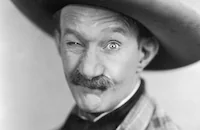
James Finlayson
Creighton Hale
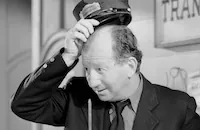
Hank Mann
Francis Mcdonald
Bert Roach
Heinie Conklin
Franklyn Farnum
Eric Alden
Buddy Gorman

Margaret Field
Ethel Clayton
Dorothy Barrett
Noreen Nash
Harry Hayden
Albert Pollet
Julia Faye
Max Willenz
Chester Clute
Jimmy Dundee
Bert Moorhouse
Len Hendry
William Meader
John Tyrell
John Deauville
Myrtle Anderson
Helen Crozier
Louise Clark
Anita Brown
Hal K. Dawson

Emmett Vogan
Harlan Briggs
Frances Morris
Gloria Williams
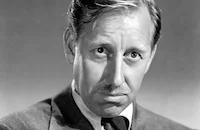
Frank Ferguson
George Carleton
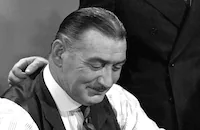
Edward Keane
Renee Randall
Jerry James

Eddie Kane
Frank Mayo
Peggy Leon
Eddie Laughton
Paula Ray

Bess Flowers
Lester Dorr
Lillian West
Al Hill
Betty Hill
Rex Lease
Stanley Blystone
Sidney D'albrook
Erno Verebes
Richard La Marr
Ernie Adams
George Anderson
Eddie Fetherstone
John "skins" Miller
William Forrest
Tom Dugan
Eddie Johnson
William Moss
Elmer Serrano
John Mylong
Eugene Borden
Georges Renavent
Bill Wallace
Chuck Hamilton
Myra Jones
Florence Allen
Louise Lane
Jean Acker
Laura Parrish
Lucille Shamburger
Frances Budd
Stella Le Saint
Vera Martin
Audrey Young
Bea Allen
Jerry James
Peter Trado
Sam Ash
James Clemons
Raymond De Ravenne
Hal Rand
Jac Lucas Fisher
Kit Carson
John Roberts
Shephard Houghton
Ross Murray
Gordon Arnold
Emil Zarek
Jack Shea
Byron Poindexter
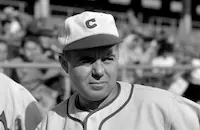
Ray Walker
Max Asher
Monte Brice
Kit Guard
Jackie, The Lion
Crew
Roland Anderson
Waldo Angelo
Robert Brower
Frank Butler
C. C. Coleman Jr.
Sam Comer
Billy Daniels
Robert Emmett Dolan
Hans Dreier
Farciot Edouart
Louis Gasnier
Edith Head
Gordon Jennings
Natalie Kalmus
Lieutenant J. J. Leonard
Joseph J. Lilley
Frank Loesser
Charles Mccarron
Gene Merritt
Ray Moyer
Walter Oberst
Ray Rennahan
Troy Sanders
Arthur Schmidt
Sol C. Siegel
Raymond Walker
Wally Westmore
P. J. Wolfson
P. J. Wolfson

Videos
Movie Clip


Trailer
Film Details
Technical Specs

Award Nominations
Best Song
Articles
The Perils of Pauline (1947)
The Perils of Pauline (1947), made when Hutton was at the peak of her fame and appeal, is very loosely based on the exploits of Pearl White, queen of the silent movie serials. The real White had been a circus performer who hurt her back falling off a horse, and had gone to work as a secretary with a film company. She got her break when the female lead of a western got sick. White didn't do many of her own stunts because of the back injury - small men stood in for her. Instead, she spent more time developing her screen persona. The Perils of Pauline is a typical biopic of the era, tailored more to Hutton's knockabout talents than to any facts about Pearl White's life and career. It's full of anachronisms, not the least of which are Frank Loesser's pop songs. But the songs are so charming, and Hutton performs them so well, that one of them, "I Wish I Didn't Love You So" was nominated for an Oscar®. Another, "Poppa Don't Preach To Me" (no relation to the Madonna song from the 1980s) was a jukebox hit.
Even though The Perils of Pauline plays fast and loose with the facts of White's life, it does offer some authenticity by casting some of White's original co-stars in cameo roles in the silent movie sequences: Paul Panzer, who played the villain in the original The Perils of Pauline (1914); and Creighton Hale, who was the hero in another White serial, The Exploits of Elaine (1914). Other silent screen actors cast in bit parts included cowboy star William Farnum and his brother Franklyn Farnum; and Mack Sennett stalwarts Chester Conklin, James Finlayson, and Keystone Kop Hank Mann. The large cast also included superb support from character actors Billy De Wolfe, William Demarest and Constance Collier.
Critics noted the film's lack of authenticity, and found the story clichéd, but enjoyed Hutton's shenanigans. "This is strictly and clearly a Hutton vehicle, streamlined to her tempestuous talents," wrote Bosley Crowther in the New York Times. "Miss Hutton plays it with enthusiasm unimpaired and with the wide-eyed and square-jawed persistence of a primitive movie queen...which makes for rib-tickling entertainment, if not authentic history...the old-time actors in the antics do their brief stints with joyful éclat."
Hutton still had two of her biggest hits ahead of her, Annie Get Your Gun (1950) and The Greatest Show on Earth (1952), but she also had a growing reputation for being difficult. When the studio refused to let Hutton's second husband, choreographer Charles O'Curran, direct her films, she walked out of her Paramount contract, and her career took a nosedive. She went back to performing onstage, but made only one more film. Plagued by personal and financial problems, she vanished from the public eye, until she was discovered in the mid-1970s working as a housekeeper for a Catholic priest in Rhode Island.
Composer Frank Loesser also had his biggest hits ahead of him. He eventually won an Oscar® for his song "Baby, It's Cold Outside," from Neptune's Daughter (1949), and wrote many other memorable songs for the movies. His greatest success came after he left Hollywood for Broadway, where he wrote the scores for such blockbuster stage musicals as Guys and Dolls and How to Succeed in Business Without Really Trying.
Director: George Marshall
Producer: Sol C. Siegel
Screenplay: P.J. Wolfson, Frank Butler, based on a story by Wolfson suggested by incidents in the life of Pearl White and Charles W. Goddard's original serial, The Perils of Pauline
Cinematography: Ray Rennahan
Editor: Arthur Schmidt
Art Direction: Hans Dreier, Roland Anderson
Music: Robert Emmett Dolan, songs by Frank Loesser
Principal Cast: Betty Hutton (Pearl White), John Lund (Michael Farrington), Billy De Wolfe (Timmy), William Demarest (George McGuire), Constance Collier (Julia Gibbs), Frank Faylen (Joe Gurt).
C-96m. Closed captioning.
by Margarita Landazuri

The Perils of Pauline (1947)
Quotes
Trivia
Many actors who were in Pearl White's movies had roles in this film: Paul Panzer played the villain in the original serial, Perils of Pauline, The (1914); Creighton Hale was the hero in White's serial Exploits of Elaine, The (1914); William Farnum came out of retirement to play himself, appearing in the same costume he wore in Riders of the Purple Sage (1918).
The balloon in the balloon sequence was shipped from Goodyear in Akron, Ohio. It was handled by Navy balloonist Lieutenant J.J. Leonard, and was equipped with an automatic camera to avoid the weight of a cameraman.
Notes
This film was dedicated "with a salute to Charles W. Goddard, who wrote the original serial The Perils of Pauline." Pearl White, the actress on whose life this film is based, was the star of that serial. The Pathé production, a two-reel, twenty-chapter serial, which was first exhibited in 1914, was directed by Donald Mackenzie under the supervision of Louis Gasnier, the technical advisor on this film. The Perils of Pauline launched White's career as a serial star and is considered by some sources to be the best known "chapter play" filmed. The romantic plot of this film was an invention of Paramount, and Daily Variety commented, "Facts of Miss White's colorful life have been sugar-coated no end." The plot line, however, of White's job in a sewing machine factory and the start of her career from 1912, when she became a stock actress, to 1923, when she retired, rich and famous, and moved to Paris, is based on White's life. As reported in New York Times, Betty Hutton, like her "daredevil prototype," performed her own stunts in the film. "Pearl's" injury in the film is loosely based on that of White, who, according to modern sources, suffered a spinal injury that required that doubles be used for more demanding stunts. White, who went on to star in over 100 films, died in Paris on 4 August 1938.
George Marshall directed a number of Ruth Roland serials beginning in 1919. Paul Panzer, who appeared as the villain in the 1914 The Perils of Pauline, made his last screen appearance in this film. Creighton Hale played the hero in White's later serial, The Exploits of Elaine. William Farnum, a silent Western star, came out of retirement to play himself. According to Los Angeles Examiner, he appeared in the costume he wore in Riders of the Purple Sage in 1918 (see AFI Catalog of Feature Films, 1911-20; F1.3719). Farnum is shown in a barroom brawl scene with veteran silent actors Francis McDonald, Ernie Adams and Snub Pollard. Chester Conklin, James Finlayson and Hank Mann, veterans of Mack Sennett's silent slapstick comedies, recreate a scene from the Keystone Cops, throwing custard pies at each other. Ethel Clayton was a silent film star at Lubin Mfg. Co. in the 1910s, as was Jean Acker.
The four adjacent movie sets within this film-a jungle picture with Hale; a melodrama with Panzer; a Western with Farnum; and a comedy starring The Keystone Cops, emulated the "assembly-line" shooting methods that were sometimes used in early film studios. Pararamount News reported that for the 350 feet of black and white scenes of the "galloping tintypes" in the film, the camera was "under-cranked" from 24 frames-a-second to the old standard of 16 frames-per-second to recreate the fast tempo; and that an even and constant illumination of lighting was used for the primitive movie scenes, since no gradation in lighting was used in 1914.
Portions of the film, including the balloon ascension scenes, were shot at Gopher Flats, also known as "The Providencia Ranch" in Burbank, CA. An antique racing balloon was shipped from the Goodyear factory at Akron, OH for the film. Navy balloonist Lieut. J. J. Leonard handled the balloon, and an automatically operated camera was used to avoid the necessity of having a cameraman on board. For the train chase scene, vintage trains were used and two miles of track were cleared along the Southern Pacific Railroad in the west San Fernando Valley, CA, which, according to Hollywood Reporter, was the same location used in the original The Perils of Pauline. Hollywood Reporter also noted that some shooting was done in Canoga Park, CA, in mid-May 1946. The studio rented a 1916 Jenny biplane, the JN-1, for some of the stunt scenes. For the press preview screening on June 24, 1946 in New York, a chapter from the 1915 Pearl White-Creighton Hale serial The Exploits of Elaine was shown. The song "Poor Pauline" was a popular hit in 1914. Frank Loesser's song "I Wish I Didn't Love You So" was nominated for an 1947 Academy Award. In 1933, Universal made a 12 episode serial remake of the 1914 The Perils of Pauline serial which was directed by Ray Taylor and starred Evalyn Knapp. In 1967, Universal released The Perils of Pauline, a television pilot based on the original film serial, directed by Herbert Leonard and Joshua Shelley, and starring Pat Boone and Pamela Austin.















